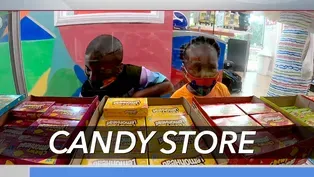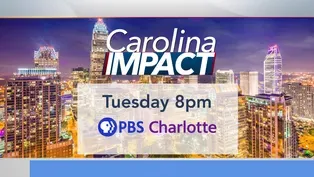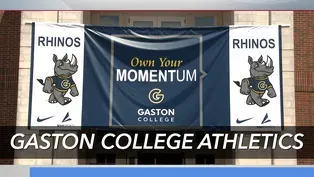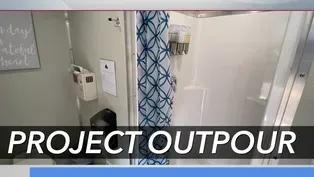
Carolina Impact: October 5, 2021
Season 9 Episode 4 | 27m 27sVideo has Closed Captions
The gold line opens, a college launches its athletic program and non-profit mobile shower
Charlotte's new gold line opens connecting the east side to the west side, but is it really rapid transit? Gaston college brings back its athletics program after 50 years and a non-profit organization provides mobile showers for the homeless community.
Problems with Closed Captions? Closed Captioning Feedback
Problems with Closed Captions? Closed Captioning Feedback
Carolina Impact is a local public television program presented by PBS Charlotte

Carolina Impact: October 5, 2021
Season 9 Episode 4 | 27m 27sVideo has Closed Captions
Charlotte's new gold line opens connecting the east side to the west side, but is it really rapid transit? Gaston college brings back its athletics program after 50 years and a non-profit organization provides mobile showers for the homeless community.
Problems with Closed Captions? Closed Captioning Feedback
How to Watch Carolina Impact
Carolina Impact is available to stream on pbs.org and the free PBS App, available on iPhone, Apple TV, Android TV, Android smartphones, Amazon Fire TV, Amazon Fire Tablet, Roku, Samsung Smart TV, and Vizio.
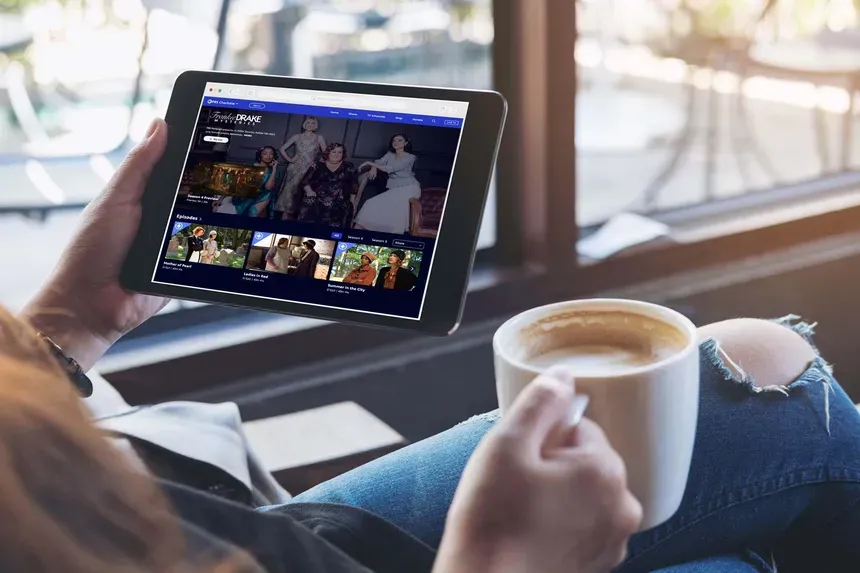
Introducing PBS Charlotte Passport
Now you can stream more of your favorite PBS shows including Masterpiece, NOVA, Nature, Great British Baking Show and many more — online and in the PBS Video app.Providing Support for PBS.org
Learn Moreabout PBS online sponsorship- [Narrator] This is a production of PBS, Charlotte.
- Just ahead on Carolina Impact.
- Yeah, the tracks stretch all the way from the east side to the west side, but is Charlotte's newest light rail, rapid transit or snail rail?
I'm Jeff Sonier, stick around.
We'll take you onboard the sleek, modern, eight mile an hour Gold Line.
- I'm Rochelle Metzger, inside a west Charlotte candy shop.
Where kids can satisfy their sweet tooth and adults can get a blast from the past.
This family owned business is serving the community in more ways than one.
We'll have their story coming up.
- Plus Gaston College brings back its athletics program.
Half a century later, we're taking you behind the scenes.
Carolina Impact starts right now.
(upbeat pop instrumental) - [Narrator] Carolina Impact covering the issues, people and places that impact you.
This is Carolina Impact.
(upbeat pop instrumental) - Good evening.
Thanks so much for joining us.
I'm Amy Burkett.
Streetcars are back on the streets of Charlotte.
Not the original streetcars from Charlotte's olden days and not the open air vintage trolleys from a few years ago.
This is streetcar 3.0, light rail style trains on what Charlotte area transit calls the Gold Line.
But Carolina Impact's Jeff Sonier says, if you're looking to get somewhere in a hurry, the Gold Line may not be the ride for you.
Jeff.
- Yeah, we're here at the far Eastern end of the expanded Gold Line.
You could see the street car rolling in behind us, just beyond Sunnyside Station.
Here's what CAT said about the Gold Line quote, "This is the first time that we've connected the east side and the west side with a rapid transit."
Well, that's partially true.
The east side and west side are connected by transit now.
Problem is it's just not very rapid.
(intense bass beat plays) We're riding the Gold Line on two weekday afternoons from four till 5:30.
That's rush hour for a lot of us.
(streetcar door dings) But the Gold Line isn't in much of a rush at all.
Our four mile street car trips, between Plaza Midwood and Johnson C Smith, all take between 36 and 40 minutes.
Which averages out to less than eight miles an hour.
- It rides in the street.
It goes slower than the speed limit.
It stops at stoplights.
And I feel like that's the problem.
It's still just a novelty.
- Chris Mullis owns Hawthorne's pizza and bar, where they're making pies inside while the customers outside, watch those slow trains roll past the patio.
Either stuck in traffic backups or often causing those backups.
(Slow Train plays) - Traffic has gotten ridiculous.
As you can actually see behind us here.
The train backs traffic up through the intersection.
(Slow Train plays) It's a streetcar.
Yeah, they switched it to these fancy nice modern cars, but it's still 18th century technology.
(Slow Train plays) I'm gonna ride it.
I don't know if a lot of people will.
I'm looking to see people in it.
If you look over at that car right now, it's empty.
(Slow Train plays) - Yep.
So far the Gold Line is also slow attracting passengers too.
For the first four months, these passengers ride free, but it was only me on long stretches of our street car rides.
At many stations, sliding open doors, but nobody's stepping on board.
- We have to remember, we're probably going to have the same kind of challenges in ridership that we're seeing on our other modes.
But we make these investments for the long term.
- [Jeff] That's what CAT's CEO, John Lewis told us before the Gold Line expansion.
That success isn't just measured in riders on the streetcar line, but also in the improvements alongside the streetcar line.
- This is not just about moving people.
It's about creating a community that people want to live in and feel comfortable in and safe and provide opportunities for upward mobility.
- [Jeff] The city's betting 150 million dollars that the Gold Line will do for five points.
West End with the blue line has done for South End NoDa and all those other light rail neighborhoods.
You can see positive change on the west side already.
What used to be an old vacant eyesore of a grocery store is now spruced up as an outdoor community meeting place.
Visible from the street car window as you ride by.
But not every neighborhood wants what light rail promises.
- It's like bringing a, bringing water to the ocean.
We're already on this side of town inundated with massive amounts of apartment growth and condos, and we've already lost so much of our neighborhood character due to that.
- [Jeff] And Mullis adds that Elizabeth also lost to the Gold Line were the mom and pop businesses that used to thrive where the streetcar stations are now, but didn't survive years of slow street car construction.
- I'm not sure that any of them are directly related to the train, but it didn't help.
Anderson's legendary for their pecan pie and iced tea here in the neighborhood for almost 60 years.
They didn't make it through that phase of the light rail.
Because during the construction phases, when they shut down that bridge, when they sat down that intersection in all four directions, it cut us off from everyone.
(sirens wailing) - [Jeff] That bridge Mullis refers to is the Hawthorne Avenue Bridge over at Independence Boulevard.
That was built and rebuilt and then rebuilt again.
Before Gold Line construction crews finally got it right.
But not before Mullis' pizza business, and lots of other businesses almost went out of business.
- We came through 2008, fairly strong.
We came through, COVID fairly strong.
This is worse.
Yeah.
Our business was off by more than 70%.
The only thing that's ever really hurt us, the thing that's hurt us the most is our own city with this project.
- This whole area, in my opinion is really gonna start changing over the next few years.
- [Jeff] And while one end of the Gold Line watches the predictions of progress from years past finally coming true.
(streetcar whistles past) What the other end sees is rapid transit minus the rapid.
Businesses slowly coming back after years of slow construction.
And a transportation improvement that's not improving transportation, instead just the opposite.
- No, the traffic is not going to go away.
It's only going to get worse.
And I think in the long run, it's not a bad idea.
To go, you know, from the west side up through the middle of town, through Elizabeth.
- [Jeff] If you're in a hurry though?
- If you're in a hurry, choose a different, choose a different mode of transportation.
I, like I said, I bike most everywhere I go.
And from end to end and back, I can beat this thing on my bike, no problem.
(streetcar engine roars) - Yeah, the streetcar is still on hold here at Sunnyside station.
No hurry, right.
CATS has plans to further expand the Gold Line, another six miles another 20 stations.
All the way from I85 on the west side to the old Eastland Mall area on the east side.
But right now those expansion plans don't have any funding and there's no timetable either.
So progress on the Gold Line going forward, kind of like the Gold Line itself.
A little slow.
Amy.
- Thank you so much, Jeff.
If you want to check out the new expanded streetcar line for yourself, head to pbscharlotte.org.
We've got a link to a complete Gold Line guide from Charlotte Area Transit.
There's a map of all the stations, fare, and schedule information.
And a video from CATS with some helpful hints on riding.
Well drive through Charlotte's historic west end district and you'll pass many shuttered storefronts.
The pandemic shut down about 35% of black owned businesses in the area.
According to the Charlotte Mecklenburg Black Chamber of Commerce, a family owned candy shop on West Boulevard is bucking that trend.
As Carolina Impact's, Rochelle Metzger tells us, the husband and wife team are using their success to build up the neighborhood, one treat at a time.
(Upbeat drum beat plays) - [Rochelle] If you're looking to satisfy that sweet tooth, (candy hits the jar) there's a candy shop in West Charlotte, where the walls are lined with lollipops and baskets of fireballs.
Below you'll find Airheads by the box.
And Now and Laters in every flavor (I Want Candy plays) It's all inside Scooter's Snacks & More which sits on the corner of the City West Commons strip mall on West Boulevard.
Owners say they offer a traditional candy store experience with a new urban twist.
- [Customer] Two of the strawberry.
- [Rochelle] Lamont and Kristina George reign over this real-life candy land.
Where you can find old school favorites like candy cigarettes, Mary Jane's, and Boston Baked Beans.
- The kids are overwhelmed.
The adults are excited because they can relate to candy cigarettes, you know, squirrel nuts and long boys.
Things that they haven't had, or they grandparents had.
- [Rochelle] If you crave a savory snack, grab a pickle, nachos or something, more filling like a hotdog or pizza.
- We go to four different markets and get different things and bring it back; St. Louis, Indianapolis, Nashville, Atlanta.
- [Rochelle] St. Louis, Missouri is home to the original Scooter's Snacks and More.
Named after Lamont's friend and partner Scooter.
When the couple moved to Charlotte five years ago, they opened a second location in the city's historic west end.
The neighborhood is lined with mom and pop shops, shuttered storefronts, and empty buildings.
But Kristina says it fit their vision.
- Well, actually we looked at some of the top 10 worst neighborhoods in Charlotte.
Because we wanted to make sure that we could be a positive influence and be a role model to the neighborhood.
(counter door opens) - [Rochelle] Just like the Georges, Breannon Davidson moved to Charlotte from St. Louis.
She says, when she walked into Scooter's for the first time, she couldn't believe her eyes.
- The riplets and all that stuff.
And I'm like, wow.
I thought we would have to be, we would have to be in St. Louis to get this.
- [Rochelle] Jay Cunningham says he often stops by for a snack.
And sometimes he brings son Messiah to pick out a special treat.
Peering through the glass counter Messiah, finds his favorite gummy candy.
Cunningham says candy, isn't the only reason he brings his son to Scooter's.
He says the George's are role models.
Who've helped revitalize City West Commons.
- Here you go young man.
Thank you.
- They treat customers like family.
- I was going in between jobs.
He let me come here.
And I worked here for, I think two, three months.
- When Scooter's first opened this area was an office.
The George's then decided to turn it into an event space, but the pandemic hit and parties were put on hold.
So the George's found a creative way to bring customers in and serve the community.
The space became a tutoring area and a safe place for neighborhood children to go.
- Anytime I can have a place that a kid can be safe and the parent can call the store phone and say, "Is my kid there?
Can you tell them to get on home?"
I can, and I'm okay, and they know me.
I mean, I feel like we have accomplished something.
- [Rochelle] Like so many entrepreneurs.
The George's had a hard time keeping the store afloat during the pandemic.
Which not only took a toll on small business, but the candy industry as a whole.
- So many different places that does sell candy has went out of business.
A lot of the different old school manufacturer couldn't keep up with Covid.
- [Rochelle] Businesses across the country are still trying to bounce back from the pandemic's impact.
Statistics show that black owned businesses were among the hardest hit.
Dr. Shante Williams president of the Charlotte Mecklenburg Black Chamber of Commerce says it was a tough lesson learned.
- I think more people thought they might've been prepared than really were.
And now I see business owners that really know their stuff, and they are really well-equipped to weather the next storm.
- [Rochelle] CNBCC's mission is to be the hub of information and resources for black owned businesses throughout the Charlotte Metro area.
- And we preach finances, finances, finances, meaning make sure that your business credit score is good.
Make sure that you have, you're up to date.
You're not just relying on your accountant or someone else to do the work that you know, your numbers.
- [Rochelle] William says pre COVID the Chamber largely focused on education.
Post COVID the organization is doing more direct financing.
- I am seeing a lot of business owners, not only seeking investment or capital into their business, but figuring, trying to figure out how they could become investors.
- [Rochelle] The George's are shining examples of this new trend of minority small business owners turned entrepreneurs.
(clippers buzzing) Three years ago, the duo purchased Ideal Barbershop, located just steps away from the candy store.
Henry Carter has been cutting hair for close to 40 years.
He spent the last four at Ideal.
He says when the George's bought the barber shop, they made a lot of changes.
- Pretty much everything you see in here is different from when I came really the chairs, the paint, the designs on the wall.
- [Rochelle] COVID-19 was hard on Carter and his fellow barbers.
Especially when they had to close up shop for months and couldn't work.
They're back to normal hours now, but continue to play it safe, by wearing masks and spacing out clients.
- It's a lot better than it was when we started, because a lot of people was afraid to come out.
But since the vaccine, a lot more of the older clients have started coming back to the barbershop.
(I Want Candy plays) - Meantime, the George's have managed to find balance in their personal and professional partnership.
Kristina handles day to day operations for Scooter's, while Lamont, pursues, new opportunities.
He encourages others who dream of starting a business to take the leap.
- Make it a unique product and make it your own.
And people will come to support you.
- [Rochelle] For Carolina Impact, I'm Rochelle Metzger.
- Thanks so much Rochelle.
The city of Charlotte is providing an $85,000 grant to revitalize the City West Commons Shopping Center.
The project, which is part of the Corridors of Opportunity Program is currently in the planning phase with a public meeting expected this fall.
Well at least 3000 people experience homelessness any night of the week.
According to Mecklenburg housing data.
Right now leaders from the public, private, and nonprofit sectors are working together on a comprehensive plan to address Charlotte's housing instability.
In the meantime, advocates who care about the people, and the problem are bringing hope to our neighbors with mobile showers.
Carolina Impact's Tonia Lyon introduces us to Project Outpour.
(upbeat inspiring music) - [Laura] We know almost all of our folks by name, after their first visit.
And we look forward to seeing them every week.
- [Tonia] If you didn't know better, you might think Laura Gorecki was part of a pit crew or quite possibly a plumber.
- [Laura] Hooking up the sewer line.
- [Tonia] Her title though suggests while she may do those things, she is much more.
- My approach to everything is unconditional positive regard.
If you talk to a thousand homeless people, you're going to find a thousand different reasons why people are homeless.
And there is no stereotype.
There is no one size fits all.
One of our folks says, this is the only time I get to have normal conversations.
Because any other other interactions he's having are with social workers or, you know, trying to access services.
You wanna help me fold some towels?
- [Tonia] Laura is known as chief dignity officer for Project Outpour.
The nonprofit provides mobile showers, hygiene items, and fresh undergarments to neighbors moving through homelessness.
She gets help from volunteers like Jane Haynes.
- I said, I'm perfect for this.
Cause I adore a good shower and feeling clean.
- There's so many light bulb moments.
Where people say, what are you, what are you doing?
I say, well, it's mobile showers.
They say, well why would you do that?
Because not everybody has access to a shower.
And then they stop and pause and go oh, I never thought of that.
(shower head turning on) And then they look inside and they say, I don't know what I was expecting, but it wasn't that and it's beautiful.
- [Tonia] Most of us don't give much thought to our shower.
It's just always there.
Since 2018 Project Outpour has been helping neighbors, without a permanent home, experience the pleasure of washing away the day's dirt on the outside while refreshing the soul on the inside.
Tim has lived on and off the streets of Charlotte for 20 years, for him, the mobile shower means friendly conversation and fresh, dry clothing on a hot humid day.
- How are you?
Young man?
- I'm happy.
I'm doing good.
No trouble, honest citizen, productive member of society.
- Did you notice what it said on Tim's hat?
It's the word success.
So I said, Tim, what does success mean to you?
And he told them the story of how he had been arrested 17 times in the first half of his life.
Well, now for the past 17 years, he hasn't been arrested at all.
Not even a traffic ticket, he tells me.
So what does success mean to Tim?
Continuing to take the next right step forward, moving forward, he said, and never looking back.
- What can we get you?
- I need a white towel.
Can I get a white one?
- I do.
- I'm reformed.
I'm a better person than I was last year.
That's what they need to know.
I am a better person.
And I learned from my mistakes.
- [Tonia] Tim says the experience here leaves him feeling more accepted and confident.
And he keeps coming because he's always treated with dignity.
It is one of Project Outpour's core values.
- You know, terms like bum or bag lady or, you know, street people.
They're just derogatory.
And they just lump everybody in one basket.
They're people.
They don't need any other labels.
They're humans.
They're people just like everybody else.
- [Tonia] The dictionary defines dignity as the state of being worthy of honor or respect.
Ask some people, and they'll say, it's something that must be earned Here, there's no judgment.
Dignity is offered freely by virtue of our shared humanity.
It's the same kind of perspective local leaders are taking as they seek solutions to understanding the systems that cause homelessness in the first place.
A shower doesn't solve the problem.
But officials do believe supportive services.
Like Project Outpour are critical in meeting people where they are and helping them gain access to more longterm solutions.
- That's what Mother Teresa said, do your little things.
Little things you can to make the world a better place.
We're all just walking each other home.
You all set?
- Enjoy your shower.
I think most of us realize that at some point in our lives there, but for the grace of God go I.
When you meet individuals who are in this situation through no fault of their own and it could happen to any of us.
Thank you sir.
Needed anything else?
- A smile (laughs) - Have a good week, sir.
- [Tonia] And Laura believes as we honor one another's dignity, we strengthen our own.
Thereby revealing Project Outpour's definition of success.
- [Laura] It's good to see you, take care.
- For Carolina Impact, I'm Tonia Lyon reporting.
- Thanks so much, Tonia.
What a great community resource.
The Project Outpour team says, it costs about $5,000 a month to keep the showers running.
They're also looking for more partners with parking lot access to electricity, water, and sewer.
We've got more details on our website.
Well as businesses and schools and restaurants and movie theaters reopen through the pandemic, new opportunities are taking shape.
At Gaston College an idea was born to bring back an athletics program, half a century later.
Carolina Impact's Jason Terzis, takes us inside the celebration.
- And now dear friends.
It is my pleasure to introduce the president of Gaston College.
And that is Dr. John Hauser.
(audience clapping) - [Jason] Packed under tents in the shade, under the trees, not even a sweltering heat of a late summer day could keep them away.
(audience cheers) A new chapter being written at Gaston college, the school unveiling its new slogan, nickname, mascot and colors.
- Dr. Hauser brought it to my attention about what he wanted to do with this program in this school.
It's not just about athletics.
It's about the whole community, the whole region.
- [Jason] Dr. John Hauser arrived as president at Gaston in June of last year.
One of his priorities, to bring athletics to a school that hadn't had a program in nearly 50 years.
- I've been in a community college system for 24 years.
So I've watched other colleges who had athletic programs and watched how they kind of had a little more life on their campus.
(cheering students) - [Jason] With a balloon release, pep rally and banners going up all across campus.
The Rhinos were officially born.
Gaston will compete in five sports over the next few years; baseball, softball, men's basketball, beach volleyball and e-sports, which is online gaming.
- The athletic outreach, is going to create a different student body here.
It's going to make us more diverse.
It's going to create some equalities that we don't have now.
And it's going to create some opportunities.
- [Announcer] There it is (cheering fans) - [Jason] To help get the program launched.
Hauser brought in Gene Banks as a special advisor.
- You know, I grew up in the Gene Banks era.
- [Jason] Banks helped launch the Duke basketball dynasty in the early eighties.
Before going on to play with Michael Jordan and the Bulls.
- [Announcer] Michael Jordan with 15 to shoot double team cross court left at Banks outside jumper, Gene Banks.
Good.
(crowd cheers) - The next thing I knew, I thought about it and woke up the next morning, I said, you know what?
This, I think I like that, I think this will be a great thing.
- So me and Gene started talking and he said, well, let me just call, let me dial somebody on his phone.
He handed it to me and it was Leonard Hamilton.
- [Announcer] Leonard Hamilton finally allows himself to smile.
- By this time I'm almost speechless.
- [Announcer] It's the Florida State Seminoles who are champions of the ACC.
- [Jason] Former national collegiate coach of the year and three time Atlantic coast conference coach of the year, Leonard Hamilton knows a thing or two about Gaston College.
- What I remember most about attending Gaston College, just opportunity to go to college and get my education.
- [Jason] Born in Gastonia.
Hamilton was a three sports star at nearby Highland High School, before enrolling at Gaston.
In the mid to late sixties, he was a star player on the basketball team, once scoring 54 points in a game.
- I feel that Gaston Community College probably has much to do with whatever little success I've had in my life as anything, any entity that I've ever been involved with.
So I'm very extremely appreciative for what that meant to me.
- [Jason] Back then Gaston was known as the Rebels.
It was a different era on many levels.
- It was challenging then.
I want you to know because it was right during the beginning of integration.
There were some hotels that we could not stay in because we had African-American players on the team.
Some restaurants we couldn't eat in and it was it wasn't all peaches and cream.
- [Jason] Hamilton went on to become a successful college coach.
While back at Gaston, the athletic program was disbanded in 1972, citing inadequate funding and facilities.
- He really helped be an inspiration for me to take that step to begin collegiate athletics here.
- [Jason] Hamilton is serving as an unofficial sounding board for Hauser, answering questions and giving advice.
- He is so passionate about this because he knows the impacts it's going to have on the kids.
Not only that we're reaching outside of this state, but within these communities.
- [Jason] But starting up an entire athletic program from scratch, isn't something that happens all the time.
And certainly isn't easy.
There's facilities, infrastructure, transportation, hiring coaches, getting players.
Tons that need to be done.
- It's most amazing process and the most grueling process, and the hardest process ever.
Just putting all this stuff together, it's just, my God, it will spin your head.
- [Coach] Atta boy (crowd cheers) - I couldn't turn down an opportunity to kind of start a program from scratch.
And I was either arrogant enough or, or dumb enough to say yes.
- Shohn Doty was hired as Gaston's baseball coach.
He comes with 25 years experience, including stops at UNC Wilmington and UNC Charlotte.
- Just overall, it's been a unique challenge.
But one that in all honesty is something that golly, I wouldn't trade for anything.
I've enjoyed this probably as much as any, any job I've ever had.
- All these coaches want to build this foundation.
It's a challenge to them.
It's a challenge to put their name, their staple, their footprint on making this a premier institution that parallels our academic side.
And they get that challenge from me every single day.
- [Jason] The short-term goal is to get the first five programs off the ground and stable.
Work on facilities and then slowly add to the mix.
- Once we get a gymnasium built.
We'll explore women's basketball and women's indoor volleyball.
- I applaud the university and the board of trustees for taking this initiative.
And I think it's going to grow and gonna create a fun environment for the community.
- We are the Rhinos!
(cheering) - [Jason] Creating campus spirit while giving students in the area, something to rally around.
Time to cheer on the Rhinos.
For Carolina Impact, I'm Jason Terzis reporting.
- Thanks so much, Jason.
Go Rhinos!
Well, that's all we have time for this evening.
Thanks so much for joining us.
We always appreciate your time.
And we look forward to seeing you back here again.
Next time on Carolina Impact.
Good night, my friends.
(upbeat pop instrumental plays) - [Narrator] A production of PBS, Charlotte.
Video has Closed Captions
Clip: S9 Ep4 | 5m 56s | Take a nostalgic trip with us to a west Charlotte candy store. (5m 56s)
Carolina Impact: October 5, 2021 Preview
Preview: S9 Ep4 | 30s | The gold line opens, a college launches its athletic program and non-profit mobile showers (30s)
CATS Gold Line: The Slow Train
Video has Closed Captions
Clip: S9 Ep4 | 6m 21s | The gold line opens up connecting Charlotte's east side to west side, but how fast is it? (6m 21s)
Video has Closed Captions
Clip: S9 Ep4 | 5m 34s | Gaston college brings back its athletics program half a century later. (5m 34s)
Video has Closed Captions
Clip: S9 Ep4 | 4m 58s | A non-profit organization in Charlotte provides hope to the homeless with mobile showers. (4m 58s)
Providing Support for PBS.org
Learn Moreabout PBS online sponsorshipSupport for PBS provided by:
Carolina Impact is a local public television program presented by PBS Charlotte
